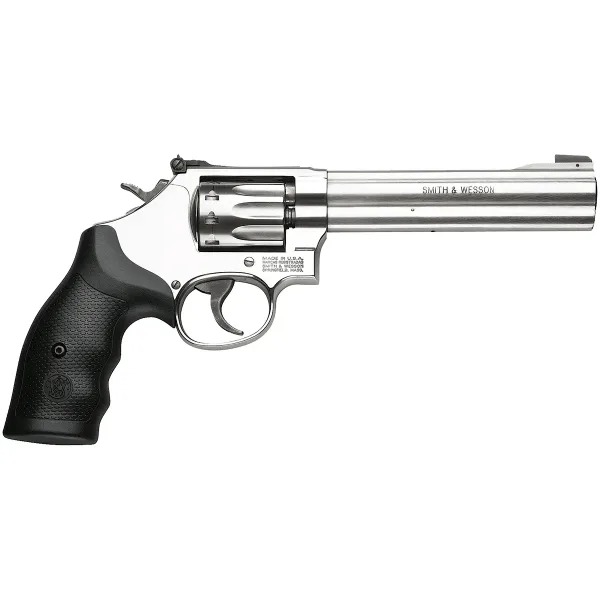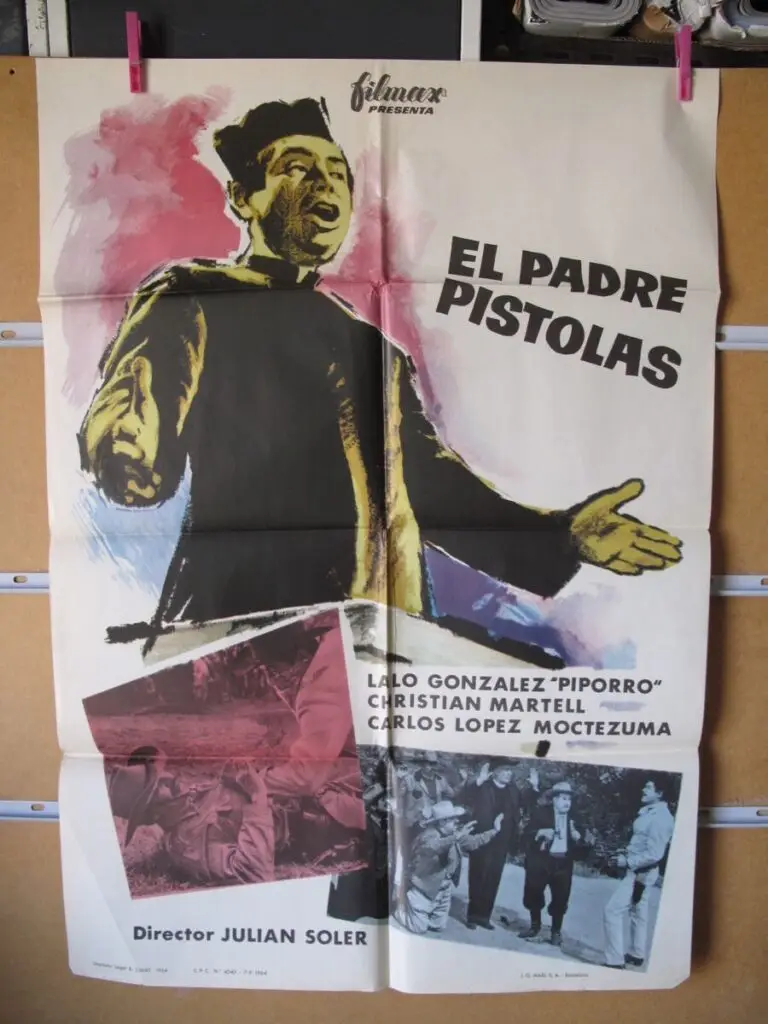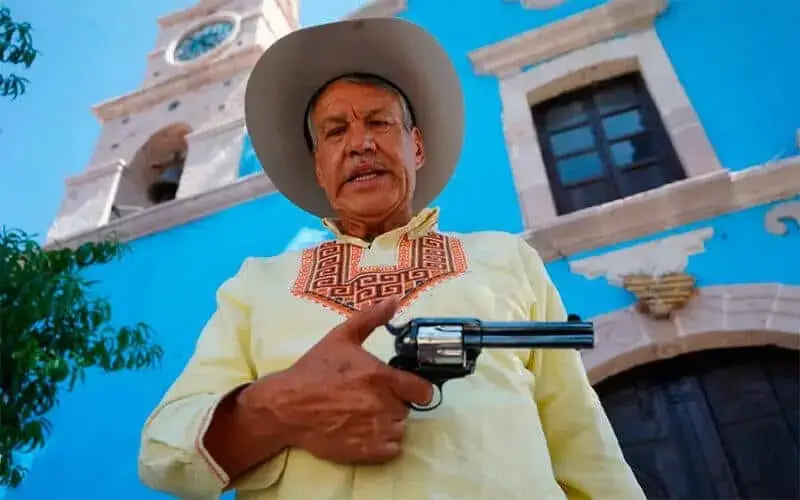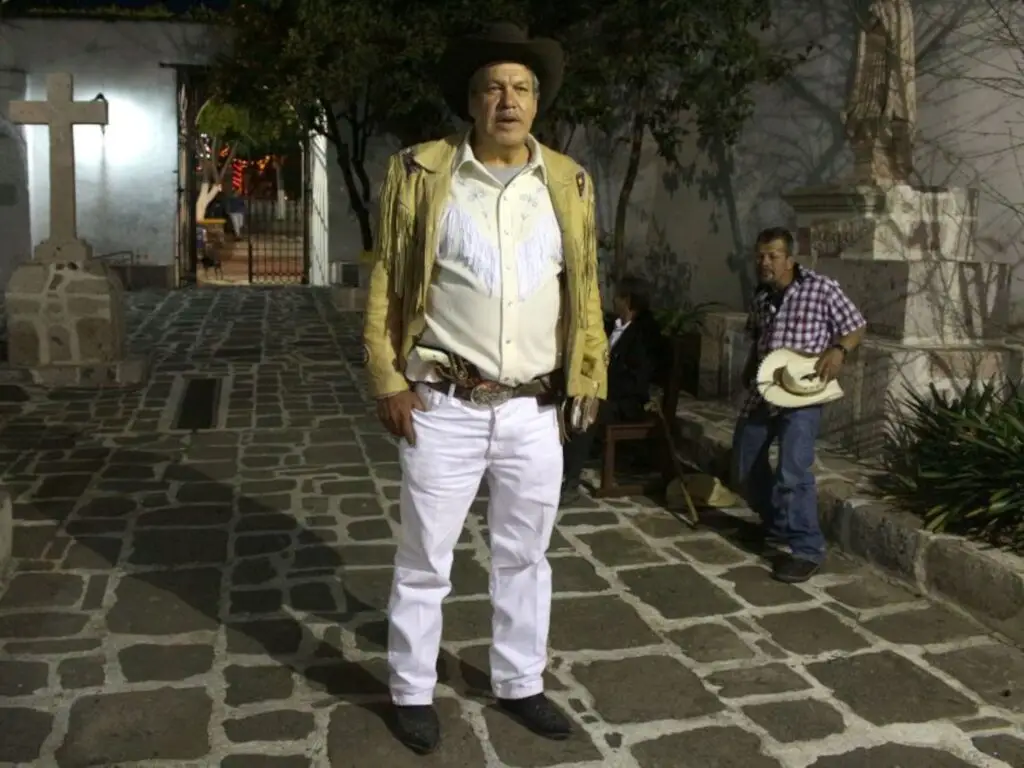El Padre Pistolas: A Gem of Mexican Cinematic Comedy
Introduction
In the vibrant landscape of Mexican cinema, few genres have resonated as deeply with audiences as comedy. Among the many films that have left an indelible mark, El Padre Pistolas (1979) stands out as a quintessential example of the era’s humor, charm, and cultural commentary. Directed by René Cardona Jr. and starring the legendary Caspar Henaine, better known by his stage name Capulina, this film blends slapstick comedy, social satire, and a touch of crime-drama parody. While not as internationally renowned as other Mexican classics, El Padre Pistolas holds a special place in the hearts of audiences for its wit, heartwarming narrative, and the magnetic performance of its lead actor. This essay explores the film’s historical context, its creative team, narrative structure, thematic undertones, and enduring legacy within Mexican popular culture.

Context: Mexican Cinema in the 1970s
To appreciate El Padre Pistolas, one must first understand the cinematic landscape of 1970s Mexico. This era saw the rise of cine de ficheras (cabaret-style comedies) and the continued popularity of family-friendly comedies featuring iconic duos like Viruta y Capulina (Marco Antonio Campos and Gaspar Henaine). By the late 1970s, Capulina had transitioned to a solo career, carving out a niche as a bumbling yet endearing everyman. Mexican cinema during this period often relied on formulaic plots, but it thrived due to its relatable humor, exaggerated characters, and ability to reflect societal issues through laughter.

El Padre Pistolas emerged at a time when audiences sought escapism from economic hardships and political tensions. The film’s lighthearted tone and Capulina’s universal appeal provided a perfect antidote to real-world struggles, ensuring its commercial success.
The Creative Forces: René Cardona Jr. and Capulina
The collaboration between director René Cardona Jr. and Capulina was pivotal to the film’s success. Cardona, a prolific figure in Mexican cinema, directed over 100 films across genres, including action, horror, and comedy. His work often prioritized entertainment over artistry, yet he had an uncanny ability to tap into popular tastes. In El Padre Pistolas, Cardona’s straightforward direction allowed Capulina’s comedic talents to shine without unnecessary embellishment.
Capulina, with his trademark bowler hat, mustache, and childlike innocence, was already a household name. His comedy relied on physical humor, exaggerated facial expressions, and a Chaplinesque ability to evoke both laughter and empathy. In El Padre Pistolas, he plays a dual role—Father Salvador, a well-meaning priest, and his lookalike brother, a reformed gangster—showcasing his versatility. Capulina’s performance anchors the film, balancing absurdity with heartfelt moments.
Plot Summary: A Tale of Mistaken Identity and Redemption
The film centers on Father Salvador (Capulina), a kind-hearted priest assigned to a rural parish plagued by crime. His arrival coincides with the release of his estranged twin brother, Chucho (also Capulina), a former gangster seeking redemption. Through a series of misunderstandings, Chucho is mistaken for the priest, while Father Salvador is wrongly accused of Chucho’s past crimes.

The plot thickens when a local crime boss, Don Severo (played by Carlos Agostí), seeks revenge against Chucho for betraying his gang. Chaos ensues as the twins navigate mistaken identities, with Chucho attempting to protect his brother’s reputation and Father Salvador trying to clear his name. The narrative is punctuated by Capulina’s signature gags, including clumsy chases, verbal misunderstandings, and slapstick confrontations with bumbling henchmen.
By the film’s end, the brothers team up to outwit Don Severo, leading to a climactic showdown that blends humor and suspense. Chucho’s redemption arc and Father Salvador’s unwavering faith provide emotional depth, elevating the film beyond mere farce.
Themes and Style: Comedy with a Conscience
At its core, El Padre Pistolas is a story about redemption, family, and the clash between good and evil. The film uses humor to explore serious themes, such as the consequences of past mistakes and the possibility of change. Chucho’s transformation from a self-serving criminal to a hero underscores the idea that anyone can seek forgiveness—a resonant message in a predominantly Catholic country like Mexico.
The film also satirizes societal institutions. The church, represented by Father Salvador, is portrayed as a force for good but is not immune to corruption or incompetence (embodied by a gluttonous, lazy parish assistant). Similarly, the criminal underworld is depicted as inept, with Don Severo’s gang serving as more comedic than threatening. This gentle satire reflects Mexican society’s ability to laugh at its own flaws while maintaining optimism.
Stylistically, El Padre Pistolas embraces the hallmarks of 1970s Mexican comedy: bright visuals, exaggerated performances, and minimal reliance on special effects. Capulina’s physical comedy—such as tripping over his robes or pretending to fire imaginary pistols—drives the humor. The dialogue is peppered with wordplay and double entendres, though it avoids the risqué humor of cine de ficheras. The film’s pacing is brisk, with Cardona ensuring that jokes and plot twists arrive in quick succession.

Reception and Cultural Impact
Upon its release, El Padre Pistolas was a box office hit, cementing Capulina’s status as a solo star. Critics praised his dual performance, noting how he differentiated the twins through subtle gestures (Father Salvador’s gentle demeanor vs. Chucho’s streetwise swagger). However, some reviewers dismissed the film as formulaic, a common critique of Mexican comedies of the era.
Despite mixed critical reviews, the film’s cultural impact is undeniable. It became a staple of Mexican television reruns, introducing Capulina to new generations. The character of Father Salvador, with his mix of piety and comedic clumsiness, resonated with audiences who saw in him a reflection of their own struggles to do good in a flawed world.
Legacy: Capulina’s Enduring Appeal
El Padre Pistolas is a testament to Capulina’s enduring popularity. While he never achieved international fame like Cantinflas, his films remain beloved in Mexico and Latin America. His comedy transcended language barriers, relying on universal physical humor that appealed to all ages.
The film also highlights the importance of regional cinema. Unlike Hollywood blockbusters, El Padre Pistolas was made on a modest budget, tailored to local tastes, and unapologetically Mexican in its sensibilities. It serves as a reminder of an era when filmmakers prioritized connection with their audience over global appeal.
Today, the film is celebrated as a cult classic. Film historians recognize it as a key example of 1970s Mexican comedy, while fans cherish it for its nostalgia and heart. In 2019, a restored version was screened at Mexico’s Cineteca Nacional, reintroducing it to modern audiences and sparking renewed appreciation for Capulina’s genius.
Conclusion
El Padre Pistolas is more than just a comedy—it is a cultural artifact that captures the spirit of 1970s Mexico. Through its blend of humor, heart, and social commentary, the film offers insight into the values and challenges of its time. Capulina’s dual performance remains a masterclass in physical comedy, while René Cardona Jr.’s direction ensures the story remains engaging from start to finish.
In an age where global cinema often prioritizes spectacle over substance, El Padre Pistolas reminds us of the power of simplicity. Its legacy endures not only through laughs but through its affirmation of redemption, family, and the enduring appeal of a well-told joke. For those seeking a window into Mexico’s cinematic golden age, this film is a delightful starting point—a testament to the timeless magic of laughter.
pistolas venda
pistolas 9mm
pistolas metalworks
pistola 9mm
pistola 9mm glock 19
pistola 9mm beretta
pistolas de verdad
pistolas juegos
pistolas de juguete
pistolas en mano
pistolas traumaticas
pistolas de balines
pistolas de aire
pistolas taurus
pistolas glock
pistolas de gotcha

